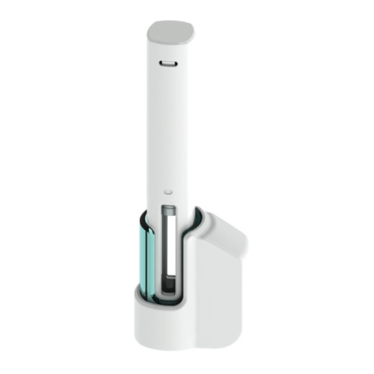Supporting Patients During Treatment
We speak with Adam Shain, Director Business Development, Digital Healthcare, and Josh Hopkins, Program Manager, AdhereIT from Noble, an Aptar Pharma company, about the AdhereIT 360 Base and AdhereIT Clip - a runner up for The Medicine Maker 2020 Innovation Awards.

AdhereIT can integrate with self-injection devices to support patients with initial onboarding and ongoing adherence to therapeutic treatments. The base and clip provide visual, audio, and haptic feedback during the injection process to guide dosing success. Encrypted data is then transferred to a smartphone app, which also incorporates patient resources, such as training videos, injection reminders, and drug reorder notifications.
Data can be shared with healthcare providers to track patient performance through a dashboard, providing real-world data to support ongoing therapeutic programs. Aggregated, anonymized data can also be made available to pharmaceutical companies to help address poor adherence.
How did the collaboration get started between Noble and Aptar Pharma?
Aptar Pharma and Noble had been working on digital health adherence and compliance solutions. Aptar Pharma was focusing on all types of delivery routes like pulmonary, nasal, dermal, and ophthalmic, while Noble was focusing on autoinjector programs. In 2019, Noble became part of Aptar Pharma, and synergies were immediately identified. Since then, we have been able to leverage skill sets from both organizations.
What trends and problems in healthcare inspired the idea for AdhereIT?
Noble invested a significant amount of time in meeting with patients and quickly realized that there was an opportunity to improve adherence and decrease user errors in the biologic self-injection space. This stems from the fact that patients are expected to perform self-injections using autoinjectors outside of a healthcare setting, without any formal training or guidance. Furthermore, Noble learned that patients are incredibly anxious each time they handle the injection on their own. We wanted to provide a solution that could, in real time, guide patients through the self-injection process, provide them feedback that they are doing it correctly and track their injection history over time, which can ultimately help improve adherence to the biologic, so they receive the full benefit from it and lessen the likelihood of injection errors.
How does AdhereIt work?
AdhereIT is a device that is used with an autoinjector to assist a patient in the self-injection process. It is designed to work with a wide array of autoinjectors currently on the market thanks to modular inserts. It works by using various sensors to detect the outputs from the autoinjector during the injection process, and through audio and visual feedback it will alert the patient if they are using the autoinjector correctly or incorrectly, such as removing the autoinjector from their injection site before completing the injection. In addition, the AdhereIT device transmits patient performance results via BlueTooth technology to an app that allows the patient to track their injection performance.
Nominations for The Medicine Maker 2021 Innovation Awards are now open. Find out more here.
Why is it important for pharma manufacturers to do more to encourage patient compliance?
We all know that one of the biggest challenges the healthcare industry faces is patient adherence to medication regimens. Drug therapies cannot work if patients do not take them and treatment success is critical to the health of many patients. There is very little visibility of what occurs to a drug once it leaves the pharmacy. A successful refill does not ensure compliance to treatment, having better ways to close that feedback loop of really understanding how patients take their drugs is a critical missing piece in the patients’ longitudinal treatment journey. It is a known fact that one of the biggest hurdles to any chronic disease is patient compliance. So, it is critical for patient health that we make the ability to take their drug as simple and fearless as possible. With AdhereIT, pharma manufacturers are better enabled to encourage patient adherence and help them achieve better health outcomes.
How has the pandemic affected attitudes to and uptake of digital technology in healthcare?
The pandemic has acted as a rapid accelerator for digital health products and programs as patients have less physical access to healthcare providers. Because of this, the patient population was forced to find new ways to engage for ongoing treatment. Prior to the pandemic, there was a heavy resistance to go digital, but now we see new trends arising in telehealth where some insurers may even encourage telehealth visits prior to an in-office visit for some conditions.
COVID-19 has also had a great impact beyond patient-facing healthcare; pharma companies across the globe have been forced to rethink the most effective ways to conduct clinical in-person clinical trials with patients. In our view, digital technology, including connected devices like AdhereIT, is revolutionizing the industry for both patients and pharma companies alike.
Why do you think connected medical devices are the future of healthcare?
Understanding the patient journey is a critical tool in developing successful treatments – and understanding how medications are utilized in the real world is an important missing piece in the ecosystem of digital health. By creating new ways to both understand and engage with patients, we will not only make better therapies, but we create more compliant, confident, and healthier patients.



















